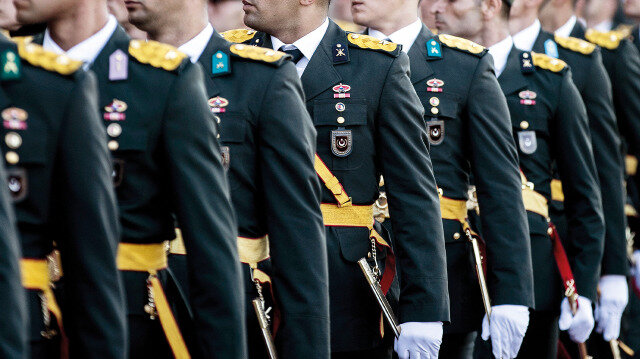Four lieutenants dismissed from the Turkish Armed Forces (TSK) in early 2024 after a dispute over wearing badges bearing a photo Mustafa Kemal Atatürk, the founder of modern Turkey and a symbol of secularism, during a 2023 ceremony at the Tuzla Infantry School have been hired by subsidiaries of the Ankara Metropolitan Municipality, according to Cumhuriyet columnist Barış Terkoğlu.
Turkish media reported in December 2023 that an altercation took place among seven lieutenants at the Tuzla Infantry School Command in İstanbul when one of them refused to wear an Atatürk badge at a ceremony on November 10 marking the 85th anniversary of Atatürk’s death and allegedly threw the badges on the ground.
The pro-government media also covered the incident, using the term “Lieutenant Junta” in front-page headlines and claiming that religious cadets were being blacklisted at the school.
Yeni Şafak alleged that a group of lieutenants organized and physically assaulted their pious colleagues following the ceremony, during which some officers did not wear Atatürk badges on their lapels, claiming a shortage of pins. The daily said the group used offensive language and later attacked other officers in the barracks.
The officers who were assaulted filed a criminal complaint, leading to the launch of an investigation, Yeni Şafak reported.
The Defense Ministry released a written statement after the media reports, saying that an administrative investigation had been initiated in addition to the ongoing judicial investigation into the incident.
The officers defended themselves before the Supreme Disciplinary Council of the Land Forces Command, which met in January 2024. The lieutenant who refused to wear the Atatürk badge and two other lieutenants who supported him did not defend themselves.
The council ruled to dismiss all seven officers: the four secularist officers who issued the warning and the three others involved in the dispute.
The Turkish military, which was once considered a bastion of secularism, frequently appears on the public agenda due to the use of religious discourse by some army officials, which many attribute to the influence of the Islamic-rooted Justice and Development Party (AKP).
The dismissals drew widespread public attention, with critics alleging that the punishment of the secularist lieutenants was unjust and possibly ideologically driven. Following their removal, the dismissed officers reportedly faced significant challenges finding employment. In response, Ankara Mayor Mansur Yavaş, a member of the secularist main opposition Republican People’s Party (CHP), stepped in to provide them jobs within the municipality’s subsidiaries.
A similar controversy unfolded during the August 30, 2024 graduation ceremony at the Turkish Military Academy, where graduates recited the secularist slogan “We are Mustafa Kemal’s soldiers” in an unauthorized oath ceremony. The event, led by valedictorian Ebru Eroğlu, sparked a political debate after videos went viral, and disciplinary proceedings were launched against several cadets and commanders involved.
These cases come in the broader context of post-coup dismissals in Turkey. After a July 15, 2016 coup attempt, which the government blamed on the faith-based Gülen movement, the military underwent a massive purge. A total of 24,706 officers and petty officers were dismissed for alleged ties to the movement, while 16,575 military students lost their connection to military institutions due to closures.
Unlike the recent hires by the Ankara Municipality, most dismissed officers have faced ongoing difficulties reintegrating into civilian life. Former lieutenant Adem Gürbüz’s story serves as a tragic example. Gürbüz was dismissed in 2018, despite participating in military operations in Syria, due to unresolved legal proceedings stemming from coup-related accusations. Stripped of his military rank and unable to find stable employment, Gürbüz suffered severe financial and emotional distress. On January 22, 2020, after years of battling depression, he died by suicide at a mosque in İstanbul.
Gürbüz’s death underscored the dire situation faced by many dismissed officers. However, their stories have largely been ignored by the Turkish media.



